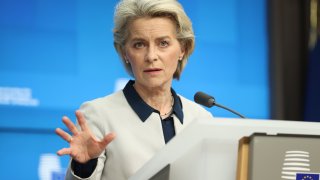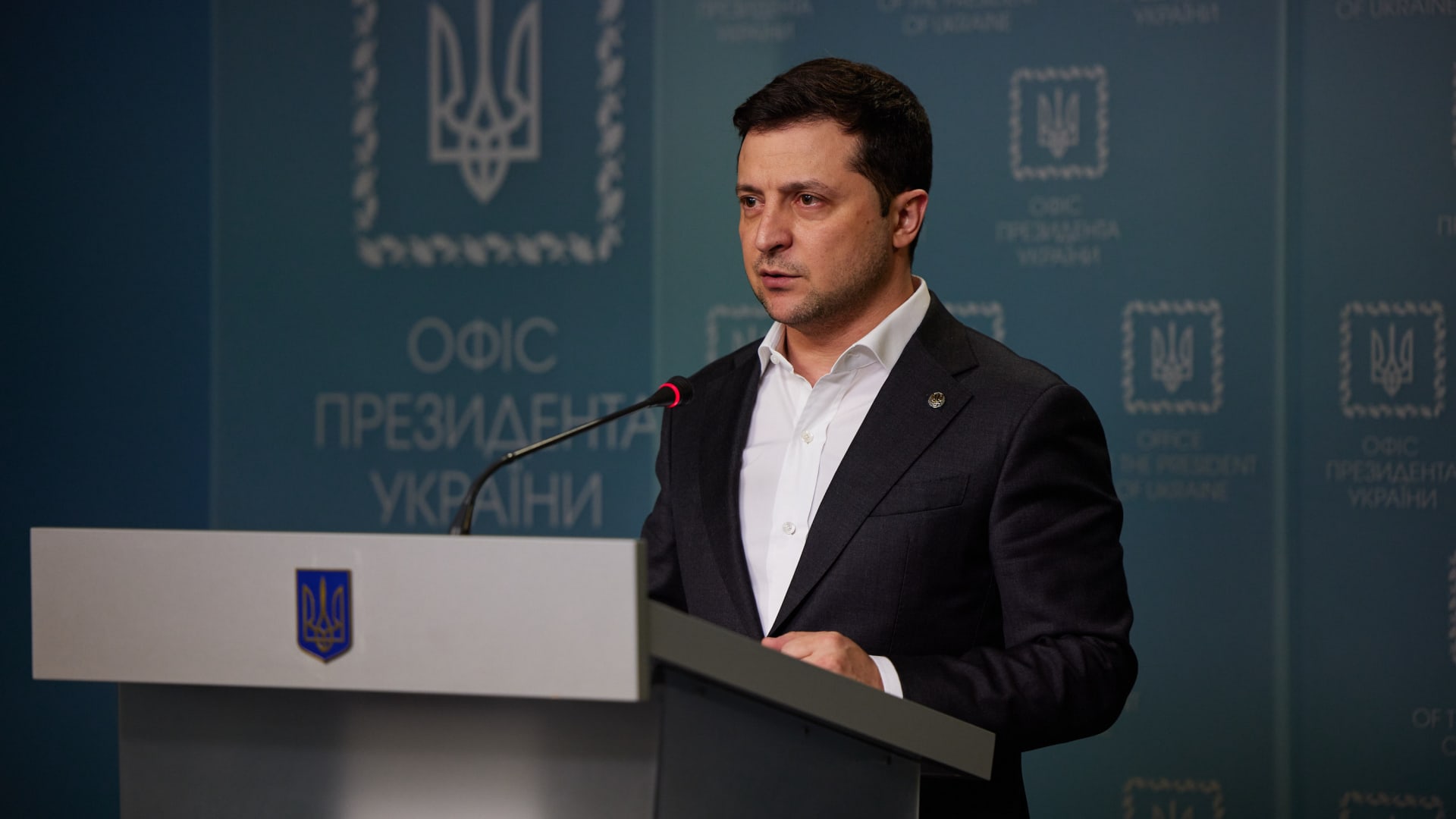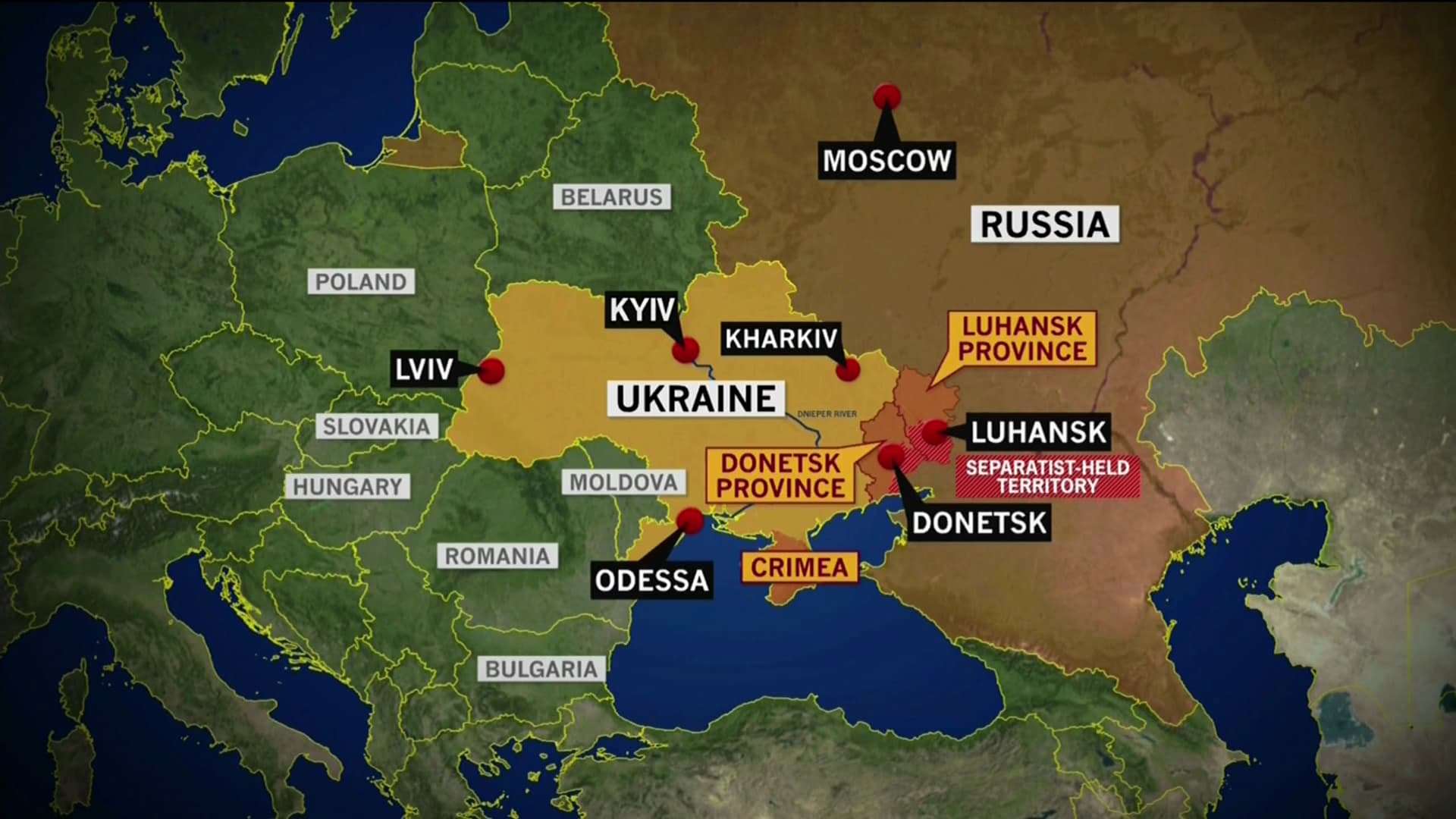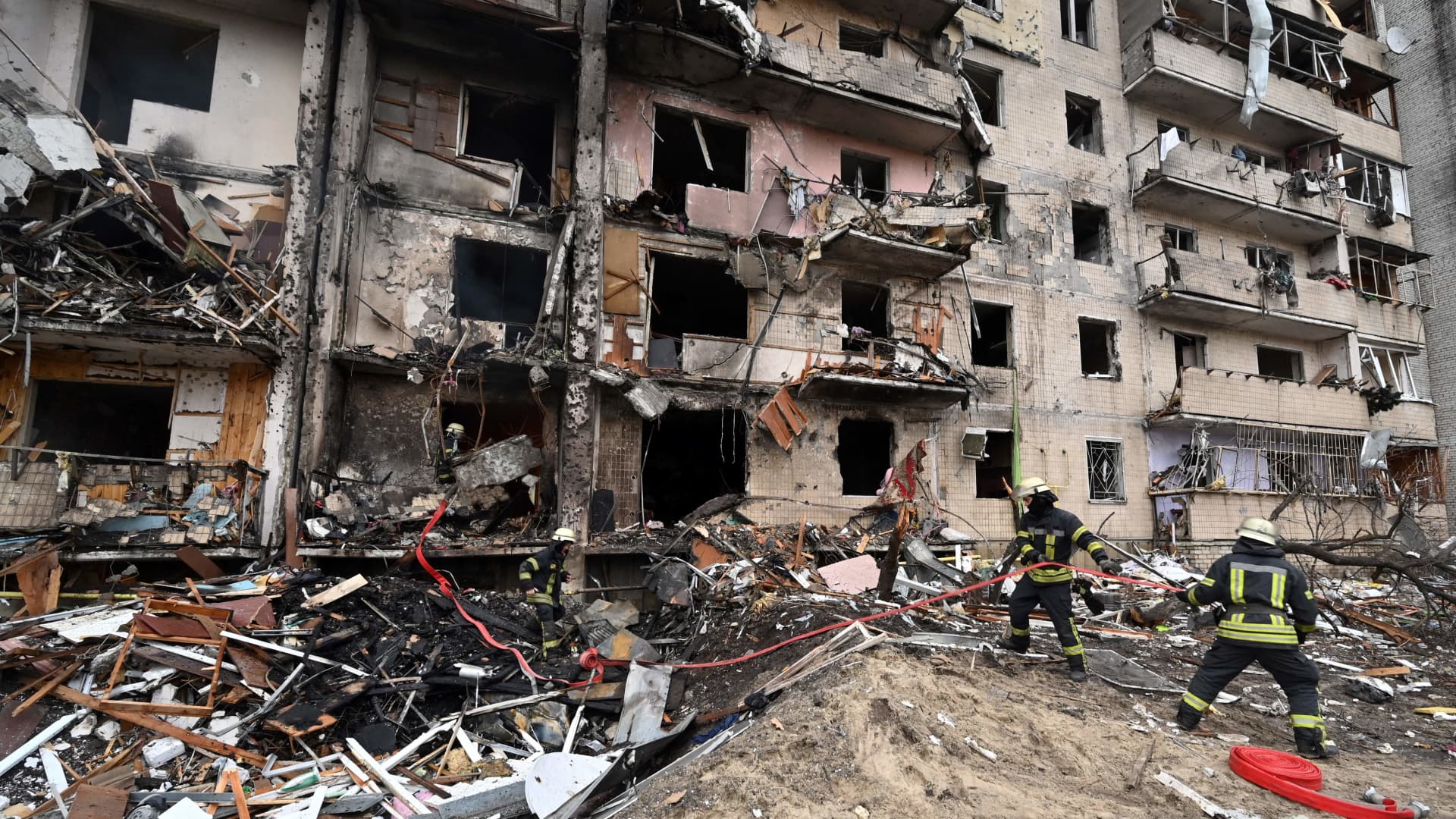
- A coordinated move to sanction Russia was designed to effectively cut off Russia's largest banks and companies from western financial markets.
- Notably, the measures stopped short of targeting the SWIFT international payments system as well as Russia's energy sector.
- Some have questioned whether they will be able to successfully deter Putin.
- Indeed, Ukraine President Volodymyr Zelenskyy has appealed to world leaders to deliver more severe economic measures.
LONDON — The U.S. and its allies have imposed a second barrage of sanctions against Russia after President Vladimir Putin launched an unprecedented invasion of Ukraine.
Some analysts have questioned their effectiveness, however, and Kyiv has called for a stronger response.
President Joe Biden on Thursday said the measures would impose a "severe cost" on Russia, Britain imposed its "largest-ever" sanctions package and the European Union agreed on new sanctions to punish "a deluded autocrat creating misery for millions."
Get South Florida local news, weather forecasts and entertainment stories to your inbox. Sign up for NBC South Florida newsletters.
The coordinated move was designed to effectively cut off Russia's largest banks and companies from western financial markets, while also targeting the country's technology sector and penalizing those in Putin's inner circle.
Notably, the measures stopped short of targeting the SWIFT international payments system as well as Russia's energy sector and some have questioned whether they will be able to successfully deter Putin.
Money Report
Indeed, Ukraine President Volodymyr Zelenskyy has appealed to world leaders to deliver more severe economic measures and sought additional defense assistance. "If you don't help us now, if you fail to offer a powerful assistance to Ukraine, tomorrow the war will knock on your door," he said.
Ukraine Foreign Minister Dmytro Kuleba said he did not wish to be diplomatic about this request, angrily calling on international allies to deliver what some analysts consider to be the most severe measure: blocking Russia from SWIFT.
"Everyone who now doubts whether Russia should be banned from SWIFT has to understand that the blood of innocent Ukrainian men, women and children will be on their hands too," Kuleba said via Twitter on Thursday.

World leaders have been split on whether to eject Russia from an international payments system through which it receives foreign currency. Biden has hinted that such a move could yet come to pass, however.
"The sanctions that we have proposed on all their banks are of equal consequence, maybe more consequence than SWIFT, number one," Biden told reporters at the White House on Thursday.
"Number two, it is always an option but right now that is not the position that the rest of Europe wishes to take," he added.
In response to the sanctions imposed by the U.S. and its allies, the Kremlin has reportedly said it will impose retaliatory measures on Western nations on the basis of reciprocity.
Kremlin spokesman Dmitry Peskov said sanctions would cause difficulties for Moscow but they would be solvable, Reuters reported.
Sanctions 'not for deterrence'
"The first thing to recognize is the point of sanctions is not to change Russia's course of action. I think everybody realizes that that will be determined by military and geopolitical drivers," Elliot Hentov, head of global macro policy research at State Street Global Advisors, told CNBC's "Squawk Box Europe" on Friday.
"The second point is the sanctions; you really want to inflict pain without destabilizing the financial system broadly. The cutting out of SWIFT does not mean you shut them out of financial services or financial systems," Hentov said.
"There [are] two parts of the equation. One is you basically have to delink their access, shut down the corresponding banking system, exclude them from participation in the U.S. dollar system and then SWIFT is just the messaging system that sits on top of that," he continued.
"Both of those actions are highly destabilizing so we should expect continued volatility coming out of just simply the sanctions talk as well in the coming days."

Russia's attack on Ukraine via land, air and sea has ratcheted up fears of a devastating humanitarian crisis and sent shockwaves through financial markets.
A series of explosions were heard on Friday morning in the capital city of Kyiv. Zelenskyy said that at least 137 people had been killed with hundreds more injured during the first day of the invasion. CNBC has been unable to independently verify the numbers of casualties on any side.
The situation on the ground in Ukraine is extremely fluid, and accounts of the military situation are difficult or impossible to confirm.
In a pre-drawn address on Russian television earlier this week, Putin sent a chilling warning to any countries considering whether to leap to the defense of Ukraine. "No one should have any doubts that a direct attack on our country will lead to defeat and dire consequences for any potential aggressor," he said.

"Sanctions are here not for deterrence at this point," Orysia Lutsevych, head of the Ukraine Forum at the Chatham House think tank, told CNBC via email.
"They should aim at putting an end to [the] Putin regime. He is a danger to Europe and to the world. Where is the West that was preaching defence of democracy and fights with autocracy?"
Most disappointing of all, Lutsevych said, was the position of Germany and Italy on blocking Russia from SWIFT.
German Chancellor Olaf Scholz has said he is opposed to cutting Russia off from the international payments system, arguing it is necessary to have leverage should the situation escalate even further.
Do sanctions work against Russia?
To some, the conventional wisdom is that Russia is well-protected against punitive economic sanctions. This view is premised on the grounds that Moscow has spent several years bulking up its foreign reserves — especially Chinese yuan and gold — and reducing its dependence on external debt.
What's more, sanctions have historically been ineffective at deterring Russian aggression.
Analysts at political risk consultancy Verisk Maplecroft, however, believe Russia "is far from invulnerable to Western retaliation."

As of mid-2021, they said in a research note published Thursday that around 49% of central bank reserves were held in dollars and euros; and the same proportion located in the U.S., Canada, European capitals and in Japan.
"That means that any full US designation of the Central Bank, and wider EU-US banking curbs, could have a sweeping impact on both the ruble and the country's financial stability, commerce, and ultimately on household savings," analysts at Verisk Maplecroft said.
What about energy?
Sanctions taken to date have largely sought to avoid targeting Russia's energy sector, a dramatic move that would likely have far-reaching implications given Russia's role as the world's second-largest producer of natural gas and one of the world's largest oil-producing nations.
Roberto Gonzalez, a former Treasury Department deputy general counsel during the Obama administration, told CNBC's "Capital Connection" that it would take some time for the sanctions imposed to harm the Russian economy.
"Whether this will be effective of course is just a matter of speculation, but it is compared to what we did in 2014 when Crimea was annexed by Russia, this is a significant step of punitive measures," he added.
Gonzalez, who's now a partner at law firm Paul, Weiss, Rifkind, Wharton & Garrison, said he expects further international sanctions could yet target Russia's energy sector.
"I think it was natural for the government to start with the financial sector, primarily, they hit banks that constitute about 80% of Russia's banking assets, but I think there is more to come and certainly … the energy sector is incredibly important," Gonzalez said.






